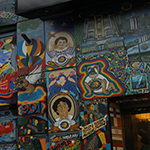Euroacademia Conferences
 Europe Inside-Out: Europe and Europeanness Exposed to Plural Observers (9th Edition) April 24 - 25, 2020
Europe Inside-Out: Europe and Europeanness Exposed to Plural Observers (9th Edition) April 24 - 25, 2020 Identities and Identifications: Politicized Uses of Collective Identities (9th Edition) June 12 - 13, 2020
Identities and Identifications: Politicized Uses of Collective Identities (9th Edition) June 12 - 13, 2020 8th Forum of Critical Studies: Asking Big Questions Again January 24 - 25, 2020
8th Forum of Critical Studies: Asking Big Questions Again January 24 - 25, 2020 Re-Inventing Eastern Europe (7th Edition) December 13 - 14, 2019
Re-Inventing Eastern Europe (7th Edition) December 13 - 14, 2019 The European Union and the Politicization of Europe (8th Edition) October 25 - 26, 2019
The European Union and the Politicization of Europe (8th Edition) October 25 - 26, 2019 Identities and Identifications: Politicized Uses of Collective Identities (8th Edition) June 28 - 29, 2019
Identities and Identifications: Politicized Uses of Collective Identities (8th Edition) June 28 - 29, 2019 The European Union and the Politicization of Europe (7th Edition) January 25 - 26, 2019
The European Union and the Politicization of Europe (7th Edition) January 25 - 26, 2019 7th Forum of Critical Studies: Asking Big Questions Again November 23 - 24, 2018
7th Forum of Critical Studies: Asking Big Questions Again November 23 - 24, 2018 Europe Inside-Out: Europe and Europeanness Exposed to Plural Observers (8th Edition) September 28 - 30, 2018
Europe Inside-Out: Europe and Europeanness Exposed to Plural Observers (8th Edition) September 28 - 30, 2018 Identities and Identifications: Politicized Uses of Collective Identities (7th Edition) June 14 - 15, 2018
Identities and Identifications: Politicized Uses of Collective Identities (7th Edition) June 14 - 15, 2018
The Home and the World
-
-

-
Presentation speakers
- Leander Gussmann, Academy of Fine Arts, Vienna, Austria
- Download presentation
Abstract:
The prospective paper aims to elucidate a praxis that negotiates cosmopolitical strategies of creating a common world. It surveys a topology of 26 Couchsurfing homes in Europe, describing places that materialize cosmopolitanism through the practices of hospitality. Furthermore, this paper constructs thereof an assemblage of a European open home. The central question in this paper asks what is cosmopolitcal praxis in the context of the European Home. And how is such praxis mediated onto the global scale? The empirical data is based on interviews that were conducted in the course of six month. A total of twenty-six face-to-face interviews in 20 different EU countries and three Skype interviews were conducted, amounting to 34 hours of recordings. The interviewees were all found within the Couchsurfing social network website. Traditionally, Cosmopolitanism theorizes the specific type of relationship one has with the world. The structure of that relationship generates an allegiance to the “worldwide community of human beings.” (Nussbaum & Cohen 1996, p.162). This worldwide community has come into question. Bruno Latour argues that the one cosmos, which the worldwide community relates to is lost (2004). Hence he suggests “a common world, if there is going to be one, is something we will have to build, tooth and nail, together.” (Latour 2004, p.455) The research is positioned in relation to two shifts in Cosmopolitical Theory. First, a shift away from the questions ‘what is cosmopolitanism?’ and ‘who are the cosmopolitans?’ toward a concern for the forms of lived cosmopolitanism. Especially questions that interrogate how cosmopolitanism is “experienced by different groups and individuals in the micro-scale of everyday life interactions in concrete times and places.” (Rovisco & Nowicka 2011, p.446) The everyday and the ordinary are also prominent in the second shift that concentrates on the “considerations of cosmopolitanism as moral politics that is articulated in ordinary ways of thinking and acting of those agents that are active at the grassroots level in a range of transnational informal networks”.
-
Related Presentations

Forget Theory! Work as Non-Reflective Praxis
- Emanuel Crudu

















